Grace Quigley Blu-ray Movie
HomeGrace Quigley Blu-ray Movie 
Kino Lorber | 1985 | 87 min | Rated PG | Jul 16, 2019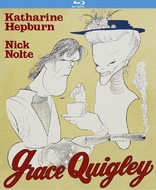
Movie rating
5.9 | / 10 |
Blu-ray rating
| Users | 0.0 | |
| Reviewer | 2.5 | |
| Overall | 2.5 |
Overview
Grace Quigley (1985)
Grace Quigley is nearing the end of her life, living alone in her New York apartment. One day she witnesses a murder being committed by top hit-man, Seymour Flint. She decides to blackmail him into killing her, however, she has one or two friends he has to get rid of first.
Starring: Katharine Hepburn, Nick Nolte, Elizabeth Wilson, Walter Abel, Paula TruemanDirector: Anthony Harvey (II)
| Comedy | 100% |
Specifications
Video
Video codec: MPEG-4 AVC
Video resolution: 1080p
Aspect ratio: 1.85:1
Original aspect ratio: 1.85:1
Audio
English: DTS-HD Master Audio 2.0 (48kHz, 16-bit)
Subtitles
English SDH
Discs
Blu-ray Disc
Single disc (1 BD)
Playback
Region A (B, C untested)
Review
Rating summary
| Movie | 2.5 | |
| Video | 4.0 | |
| Audio | 3.5 | |
| Extras | 2.0 | |
| Overall | 2.5 |
Grace Quigley Blu-ray Movie Review
Reviewed by Dr. Stephen Larson September 4, 2019One day in 1973, Katherine Hepburn was lodging at the home of her good friend George Cukor when she saw a parcel tossed over the fence and into Cukor's garden. She opened up what was a 50-page outline for a prospective screenplay titled Grace Quigley by A. Martin Zweiback. She read it at once and became so enamored by it that she volunteered $10,000 to go into the film's future investment. According to entertainment journalist Roderick Mann, Hepburn watched some of the miniseries Rich Man, Poor Man (1976) and decided to give the script to Nick Nolte, one of the show's three leads. Hepburn and Nolte met but the latter wasn't yet ready to do a black comedy. After the success of 48 Hrs. (1982), however, Zweiback approached Nolte and he finally agreed to the project. Producers Yoram Globus and Menahem Golan financially backed the film but weren't elated about filming in New York but gave in after Hepburn insisted. Hepburn was given carte blanche to choose a director and she picked her friend Anthony Harvey, who she collaborated with on three other film/TV projects, including her Oscar win for The Lion in Winter (1968). Industry sources indicate that Hepburn put $80,000 of her own money into the production in order to cover salary differences for a higher-quality crew.
When Grace Quigley premiered at the 1984 Cannes Film Festival with a run-time of 102 minutes, it was met with "yawns of indifference," according to those in attendance. Harvey went back to the cutting room and trimmed it to 87 minutes for general release. Mann reported that 18 months after initial filming, Harvey got Hepburn and Nolte back together to shoot a new (happier) ending. But the film's reopening in New York was hit hard by bad reviews. Rex Reed sounded a death knell with this headline: "'Quigley' Is Biggest Mistake Of Hepburn’s Career." To the protestation of Hepburn, Cannon Films permitted Zweiback to create his own "Screenwriter's Cut" under the revised title, The Ultimate Solution of Grace Quigley. The reason is likely because he and his wife, Adrienne, served as executive producers. The SC has never been commercially available for an extended period but the Los Angeles Times' Kevin Thomas and a few other critics saw it. Thomas praised Hepburn and Nolte's performances. He described the film as "more provocative and substantial than many of the other disappointments that have flooded movie screens this year."
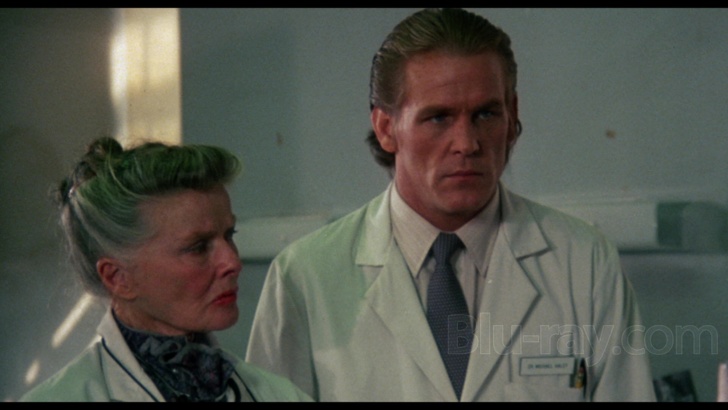
Partners in crime.
Grace Quigley (Katharine Hepburn) is a poor widow living in a New York urban tenement with her parakeet Oscar. She's heckled by her new landlord who complains about her late rental payments and her pet. While outside, Grace notices a man dressed in a trench coat (Seymour Flint, played by Nick Nolte) sneak up on the landlord and shoot him point-blank in the head. Shocked but at the same time curious about knowing more about the killer, she tucks herself surreptitiously in his backseat with his silencer beside her. She arrives at Seymour's doorstep the next day and threatens to turn him in. The two begin talking and she has an idea that he could become her business partner in a so-called "death society" enterprise. They could recruit elders who wish to expire via euthanasia and he would perform the dirty work.
Grace Quigley develops into a mother/son buddy comedy not unlike Harold and Maude (1971). Hepburn and Nolte have decent chemistry but the film is short on sight gags and doesn't have a whole lot of material to sustain interest, even for under ninety minutes. The ensemble of fine character actors such as William Duell, Elizabeth Wilson, and Walter Abel each perform their roles commendably but there isn't that much for them to do except prepare for death. A. Martin Zweiback came up with an original premise but I just couldn't get myself fully invested in his story.
Grace Quigley Blu-ray Movie, Video Quality 
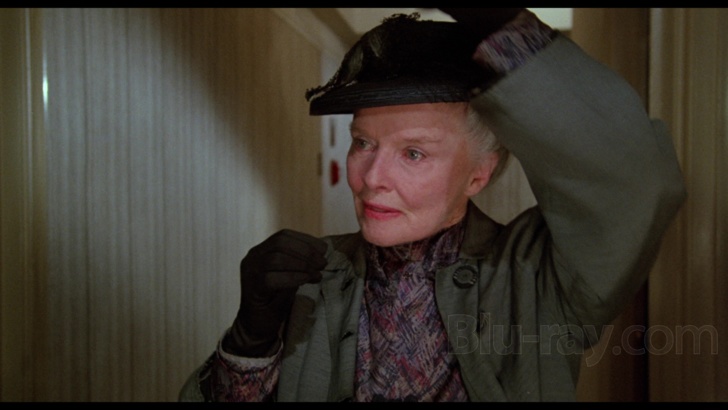
Kino Lorber rolls out the same "Director's Cut" of Grace Quigley that Anthony Harvey reassembled for American audiences in 1985. My research shows that MGM/UA's videocassette also runs about 87 minutes, as does the Australian DVD. The movie appears in its original theatrical aspect ratio of 1.85:1 on this MPEG-4 AVC-encoded BD-25. Grace Quigley looks remarkably good for the most part. Skin tones are precisely delineated on each of the actor's faces with no evidence of manipulation in post. Hepburn has her natural ruddy complexion (see Screenshot #10) and Nolte's is fairly dark and warm (see #s 11-13). There is no color bleeding. The image can look occasionally drab and soft (see #1). Artifacts have been kept to a minimum. My video score is 4.25.
The usual eight scene selections accompany this DC.
Grace Quigley Blu-ray Movie, Audio Quality 
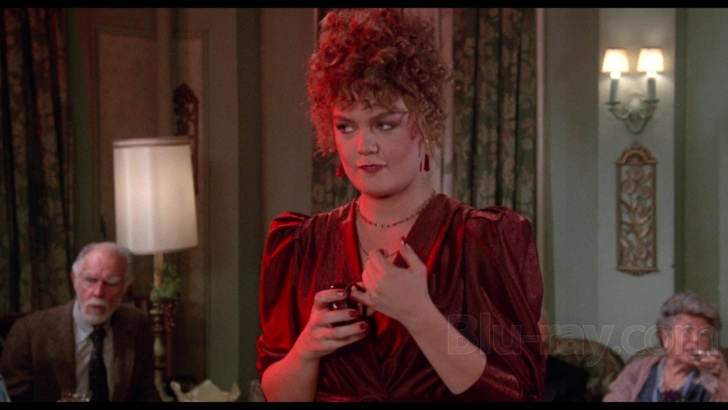
Kino supplies the original monaural in a DTS-HD Master Audio Dual Mono (1558 kbps, 16-bit). Grace Quigley is very dialogue-driven and spoken words have been adequately rendered on this mix. I know John Addison's work from Hitchcock's Torn Curtain (1966) and Attenborough's A Bridge Too Far (1977) and the composer's penultimate score is a modest effort by comparison. It employs low-key piano for supportive backdrop. There are no audible technicalities with this lossless presentation and I imagine that this is what it sounded like back in '85.
I tested the optional English subs and they provide an accurate transcription of the dialogue.
Grace Quigley Blu-ray Movie, Special Features and Extras 
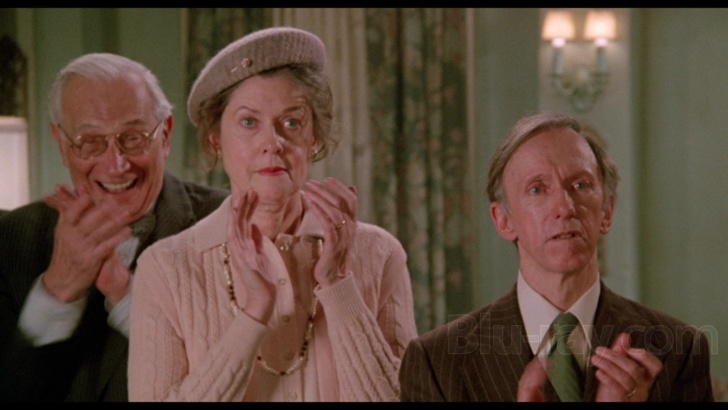
- Audio Commentary by Film Historian and Filmmaker Daniel Kremer - Kremer has kind of a low, nasally voice so I really had to turn the sound up to fully comprehend him. Kremer is a big admirer of Anthony Harvey's oeuvre and unabashed defender of Grace Quigley. He talks about several of Harvey's other movies and connects their themes with this one. Kremer also addresses the film's poor reception and screening history. In English, not subtitled.
- Theatrical Trailer - Grace Quigley's official trailer. I watched it on another Kino disc and the subpar picture lowered my expectations for how Kino would handle the BD transfer. I was pleasantly surprised. The trailer doesn't contain any spoilers.
- Bonus Trailers - trailers for titles that either Hepburn or Nolte starred in, or which Harvey directed. They include A Delicate Balance, The Lion in Winter, They Might Be Giants, Jefferson in Paris, and Mulholland Falls.
Grace Quigley Blu-ray Movie, Overall Score and Recommendation 
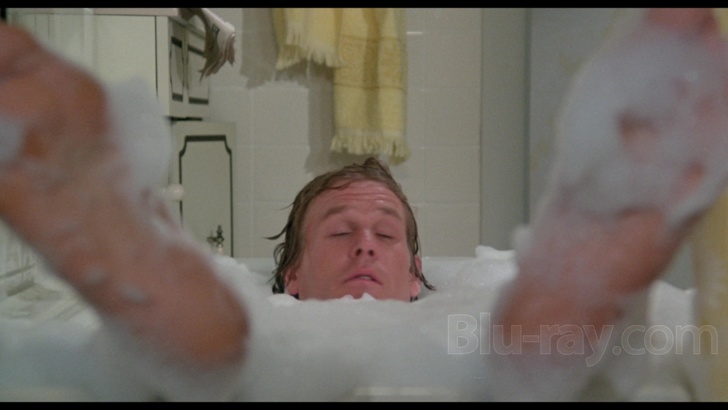
Daniel Kremer makes the important point on the commentary that a novice viewer to Anthony Harvey's cinematic world should likely see Grace Quigley last (or second-to-last). Kremer recommends seeing Eagle's Wing (1979) as an introduction to Harvey's work. While I'm mostly unfamiliar with Harvey, Grace Quigley didn't do much for me in spite of a pretty novel concept. I'm much more inclined to revisit Hitch's The Trouble with Harry (1955) and Kotcheff's Weekend at Bernie's (1989) before returning to this. Kino delivers a surprisingly good transfer and an adequate uncompressed mono track. If you're a big fan of Hepburn's, I'd recommend a RENTAL or stream before considering a purchase.
Similar titles
Similar titles you might also like

The Odd Couple
1968

The Night They Raided Minsky's
1968

The Odd Couple: The Complete Series
1970-1975

Hail the Conquering Hero
1944

Nobody's Fool 4K
1994

Diner
1982

The President's Analyst
Special Edition
1967

Pocketful of Miracles
1961

Bullets Over Broadway
1994

A Night at the Opera
Warner Archive Collection
1935

Quick Change
Warner Archive Collection
1990

Manhattan Murder Mystery
Limited Edition to 3000
1993

The Farmer's Daughter
1947

An Inspector Calls
1954

Harry in Your Pocket!
1973

Man on the Flying Trapeze
1935

The Great McGinty
1940

The Couch Trip
1988

The Cheap Detective
1978

A Night in Casablanca
1946